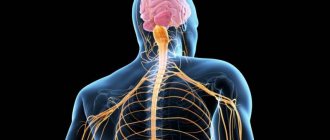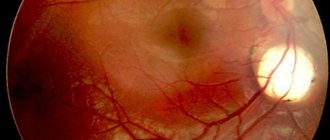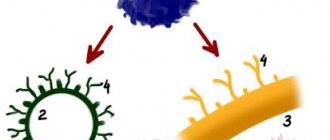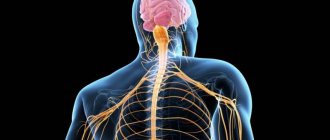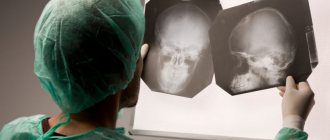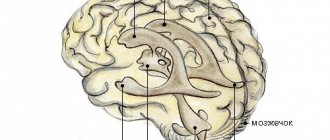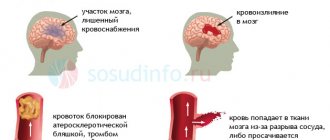What is organic damage to the nervous system?
Organic damage to the central nervous system
- a pathological condition in which the brain does not function fully. The lesion can be congenital or appear due to trauma, stroke, infectious diseases of the brain, alcoholism and drug addiction.
Lesions are divided into grades 1-3. Stage 1 lesions are diagnosed in many people; they do not manifest themselves in any way and do not require treatment. Lesions of degrees 2 and 3 interfere with normal life and can provoke more dangerous diseases, so they need to be treated.
Types of nervous system diseases
The peripheral NS performs the communication function. Fibers reach out to every organ, tissue, and cell in the human body. Thanks to these connections, the brain receives complete information about life processes. This allows you to regulate the functioning of the body, respond in a timely manner to destructive factors, and maintain vital functions.
Since the entire human body is permeated by nerve fibers, NS diseases can be expressed in various pain symptoms. Based on the location of pain, one or another lesion can be diagnosed.
Doctors distinguish the following groups of diseases of the central nervous system and PNS:
- Vascular - they are divided into chronic and acute. The chronic group includes cerebrovascular accidents, chronic cerebral ischemia (also called encephalopathy), and vascular parkinsonism. Acute - strokes, ischemic attacks.
- Infectious are meningitis (inflammation of the meninges), encephalitis (inflammation of the brain matter), myelitis (inflammation of the spinal cord).
- Autoimmune – damage to the nervous system as a result of inadequate functioning of one’s own immunity. The most common manifestation is multiple sclerosis.
- Neurodegenerative diseases are diseases that are accompanied by the death of nerve cells. Among this group are Parkinson's and Alzheimer's diseases.
- Traumatic – damage to the brain or spinal cord as a result of trauma.
How does organic damage to the nervous system manifest and what is dangerous?
When the central nervous system is damaged, the following symptoms are observed:
- fast fatiguability;
- impaired coordination, inability to perform simple movements and actions because of this;
- problems with hearing, vision;
- inability to concentrate on a task, the need to constantly be distracted;
- trouble sleeping, insomnia, nightmares or constant awakenings;
- urinary incontinence;
- decreased immunity, which often causes colds and other diseases.
Brain lesions are especially dangerous for children who are lagging behind in physical development and cannot study normally and communicate with peers. Also, lesions lead to oligophrenia, that is, mental retardation, and dementia - loss of skills and knowledge, and the inability to acquire new ones.
Nervous diseases: symptoms
The manifestation of a particular disease of the nervous system depends on which “section” of the nervous system has undergone pathological damage. So, for example, nervous diseases with brain damage have symptoms: - dizziness; - headache; - poor coordination when walking; - speech impairment; - decreased visual function; - hearing impairment; - paresis; — violation of the psycho-emotional state. Nervous diseases that arise due to damage to the spinal cord are manifested by symptoms: - impaired sensitivity below the lesion; - impaired motor function (up to paralysis). Pathologies of the peripheral nervous system are manifested by: - loss of sensitivity in the extremities; - muscle atrophy; — somatics in affected areas; - impaired motor skills of the arms and legs; - trophic disorders in the affected area. Among other things, obvious symptoms of nervous diseases: sleep disturbances, decreased memory, intelligence, psycho-emotional breakdowns, hysterics, epileptic seizures, disruption of habitual mental activity.
Advantages of treating central nervous system lesions in our clinic
- We accept adults and children
. We enroll adult patients and preschool children. We send young patients to a doctor who specializes in brain damage in children. - We treat children in the presence of parents
. If a child experiences fear or anxiety, we conduct a consultation in the presence of the parents. If necessary, we carry out further treatment in front of the parents to reduce stress for the child. - We select therapy individually
. We assess the degree of damage, the presence of concomitant diseases and disorders. We select treatment taking into account the patient’s age, general health, and response to previous therapy. - We warn you about the duration of treatment and possible results
. We will tell you how long the treatment can last, since organic lesions require long-term therapy. We predict how effective the therapy will be in a particular case, and discuss this with the patient.
To make an appointment with a doctor, call or use the feedback form. The administrator will call you back, answer questions and help you choose a convenient appointment time.
Consequences of diseases of the nervous system
The consequences of diseases of the central nervous system or PNS are among the most severe. As a result of a disruption in communication between organs and the brain or due to pathology in the work of the main control organs (brain and spinal cord), a person may be paralyzed, lose vision, speech, memory, habits of adequate social behavior, or die. What complications can occur with various lesions of the nervous system?
Consequences of vascular diseases of the brain and spinal cord
Vascular diseases include 40% of neurological pathologies. As a rule, these are chronic processes that, in extreme degrees of development, become acute, threatening human life.
The most common result of chronic vascular pathology that affects brain tissue is stroke. This acute condition occurs when a blood capillary supplying the brain ruptures. The traumatic consequences depend on the size of the hemorrhage that occurs and the timing of providing medical care to the person. Often during a stroke, paralysis (complete or partial), loss of consciousness, speech, and possible death occur.
Consequences of infectious diseases of the central nervous system
Infectious caused by pathogenic bacteria and viruses. The most famous example of infectious inflammation of the brain is meningitis. A well-known inflammatory disease of the spinal cord is poliomyelitis.
Possible consequences of meningitis:
- Headache.
- Possible idiocy and other intellectual impairments.
- Blindness and deafness are possible.
- Convulsions are possible.
Complications of polio are as follows:
- Paralysis is possible (temporary or permanent, for the rest of your life).
- Muscle atrophy is possible.
- Possible breathing problems.
- Decreased muscle tone.
- Poor load tolerance.
- Weak tolerance to low temperatures.
The consequences of the infection vary from person to person. From headaches that subside over time to paralysis and death. The level of consequences is determined by the body, its reaction to infection, and general immunity . In any case, a person with good health tolerates infectious diseases of the central nervous system more easily, without serious complications.
Consequences of autoimmune diseases
A striking example of an autoimmune lesion of the nervous system is multiple sclerosis. It is called the death sentence and curse of civilization. The number of patients with this diagnosis is growing every year.
There are many causes of autoimmune processes - stress , environmental pollution, bad habits , chronic vitamin deficiency. The result is the same - loss of coordination, memory loss, as well as body pain, numbness of the limbs, and facial paresis. Over time - decreased intelligence, uncontrollable bowel movements.
Consequences of neurodegenerative damage
Let's look at the consequences of the death of neurons using the example of two diseases - Parkinson's and Alzheimer's.
Parkinson's disease develops:
- Tremor of the limbs.
- Slowing down movements.
- Impaired coordination and balance.
- Loss of control over bowel movements and urination.
For Alzheimer's disease:
- Frustration and memory loss, first short-term, then long-term.
- Disorientation.
- Speech disorder, loss of speech skills, difficulties with communication .
- Loss of muscle mass and ability to move.
Diseases of the nervous system lead to serious disorders. It is difficult to treat them; it is easier to prevent them. What prevention of nerve damage is most effective and accessible?
ICD 10 code
Demyelinating diseases of the brain ICD 10 have codes:
- G35-G37 – demyelinating diseases of the central nervous system;
- G35 – multiple sclerosis;
- G37 – other demyelinating diseases of the central nervous system. Diseases are different;
- G37.9 – demyelinating disease of the central nervous system, unspecified.
Diseases of the nervous system are classified in ICD 10 under the code G00-G99. Experts consider the classification according to ICD 10 to be insufficiently perfect. Another disability scale has been created that is used for multiple sclerosis - EDSS. This scale evaluates all conditions in multiple sclerosis - gait, balance, paralysis, self-care and other factors. To use the scale, the doctor takes a special exam to assess the patient’s condition.
How can a doctor at Yusupov Hospital help?
The neurology department at the Yusupov Hospital employs highly qualified doctors who specialize in the treatment of demyelinating diseases. Doctors constantly exchange knowledge with specialists from other clinics both within the country and abroad. They attend conferences where they learn about modern methods of treating multiple sclerosis and other demyelinating diseases.
Specialists at the Yusupov Hospital will diagnose demyelinating diseases of the spinal cord and brain and prescribe effective drug treatment. In the hospital you can undergo a massage course and do therapeutic exercises with a specialist. Hospital psychologists work with the patient and his relatives. In the Yusupov Hospital, the patient can be observed for many years and receive the necessary medical care in a timely manner. You can make an appointment by phone.
Prevention of nervous system diseases
Effective treatment by a neurologist can not only reduce the manifestation of symptoms and prevent diseases of the nervous system, but also relieve pain attacks. There are a number of diseases when visiting a specialist becomes regular and mandatory in order to reduce the manifestation of pain, as well as continue to adhere to the usual rhythm of life for as long as possible.
In order to make a correct diagnosis, the doctor at the appointment:
- collects complaints and compiles an anamnesis (medical history: past operations, injuries, genetic predisposition);
- conducts a detailed visual inspection;
- checks the neurological status (motor function, sensitivity, etc.), determines the presence of pathology of the central and peripheral nervous system.
If necessary, prescribe additional tests and examinations, which include:
- MRI of the brain;
- Ultrasound
- Laboratory research;
- Keeping a headache diary
Timely diagnosis and correct diagnosis increases the chances of a speedy recovery and prevents the risk of serious complications.
In what cases should you consult a doctor?
Regular appointments with a neurologist are necessary if the functioning of the central and peripheral nervous system is disrupted. This can manifest itself in the form of frequent headaches, dizziness, decreased motor and sensory function, tremors, loss of coordination, blurred vision, and discomfort in the back and neck. Regular monitoring is necessary after:
- strokes;
- removal of tumors in the spinal cord or brain;
- previous injuries (accidents, falls from heights) and surgical interventions to remove benign and malignant tumors.
Consultations and early initiation of treatment for diseases such as neuropathy, epilepsy, neuritis, and transient cerebrovascular accidents are indispensable.
Children's reception
For our young patients, appointments are conducted by a pediatric neurologist. The causes of disruption of the nervous system in a child may be:
- illnesses suffered by the mother during pregnancy;
- consequences of difficult childbirth;
- mechanical injuries.
When is an appointment with a neurologist necessary without delay?
For regular and severe headaches in different lobes of the head, for sudden loss of consciousness, back pain, convulsions, diagnosed epilepsy, Alzheimer's and Parkinson's disease, after injuries and frequent pain. In such conditions, it is recommended to consult a specialist and undergo the prescribed course of therapy.
The medical appointment is conducted by experienced neurologists from Naberezhnye Chelny, who will accurately and promptly make a diagnosis and prescribe effective treatment to improve the quality of life.

